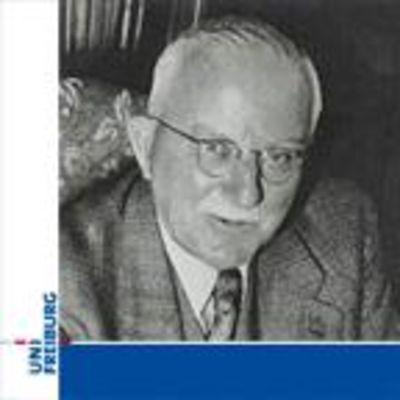Die Hermann-Staudinger-Lecture Series ist eine im Jahr 2008 von der School of Soft Matter Research initiierte Vortragsreihe, zur der die naturwissenschaftlichen FRIAS Schools zwei- bis dreimal jährlich meist internationale Nobelpreisträger zu einem Vortrag nach Freiburg einladen. Die Vortragsreihe wurde nach dem Freiburger Nobelpreisträger Prof. Hermann Staudinger benannt, der von 1926-1951 an der Freiburger Universität lehrte. Staudinger's groundbreaking elucidation of the nature of the high-molecular weight compounds he termed Makromoleküle paved the way for the birth of the field of polymer chemistry. Staudinger himself saw the potential for this science long before it was fully realized. He was appointed a Professor at Albert-Ludwig University Freiburg in 1926 and founded the first polymer chemistry journal in 1940. In 1953 Staudinger received the Nobel Prize in Chemistry for his discoveries in the field of macromolecular chemistry.
https://itunes.uni-freiburg.de/frias/gastvortraege-im-frias/hermann-staudinger-lectures
Gesamtlänge aller Episoden: 13 hours 28 minutes
- 1
- 2
- 1
- 2
21st Hermann Staudinger Lecture with Nobel Laureate Randy Schekman (Howard Hughes Medical Institute, University of California, Berkely), 09.03.2016
Unconventional secretion of proteins and RNA from cultured human cells Large particles, such as lipoproteins, collagen and extracellular vesicles are secreted from animal cells in vivo and in cell culture. These particles represent a challenge for the normal secretory machinery. We have found that the rigid rod of procollagen can be accommodated in a giant transport vesicle dependent on the usual machinery involved in traffic from the endoplasmic reticulum...
21st Hermann Staudinger Lecture with Nobel Laureate Randy Schekman (Howard Hughes Medical Institute, University of California, Berkely), 09.03.2016
Unconventional secretion of proteins and RNA from cultured human cells Large particles, such as lipoproteins, collagen and extracellular vesicles are secreted from animal cells in vivo and in cell culture. These particles represent a challenge for the normal secretory machinery. We have found that the rigid rod of procollagen can be accommodated in a giant transport vesicle dependent on the usual machinery involved in traffic from the endoplasmic reticulum...
16th Hermann Staudinger Lecture with Nobel Laureate Jules Hoffmann, 21.01.2014
Innate immunity : from flies to humans Insects make up nearly 80% of all extant species on earth and present a formidable challenge as they put one third of humanity at continuous risk of often severe diseases, namely through their role as vectors of various types of pathogens. Insects have long been known to be resistant to various types of bacterial, fungal, viral and parasitic infections...
16th Hermann Staudinger Lecture with Nobel Laureate Jules Hoffmann, 21.01.2014
Innate immunity : from flies to humans Insects make up nearly 80% of all extant species on earth and present a formidable challenge as they put one third of humanity at continuous risk of often severe diseases, namely through their role as vectors of various types of pathogens. Insects have long been known to be resistant to various types of bacterial, fungal, viral and parasitic infections...
1st Hermann Staudinger Lecture with Nobel Laureate Douglas D. Osheroff, 27. Juni 2008
For the first Hermann Staudinger Lecture, on Friday, June 27th 2008, the Freiburg Institute of Advanced Studies (FRIAS) welcomed a world-renowned physicist, Douglas D. Osheroff of Stanford University, Departments of Physics and Applied Physics. In 1996 Osheroff was awarded the Nobel Prize in Physics with David Lee and Robert C. Richardson for discovering the superfluidic nature of 3He. This discovery was made in 1971 while Osheroff was a graduate at Cornell University.
1st Hermann Staudinger Lecture with Nobel Laureate Douglas D. Osheroff, 27. Juni 2008
For the first Hermann Staudinger Lecture, on Friday, June 27th 2008, the Freiburg Institute of Advanced Studies (FRIAS) welcomed a world-renowned physicist, Douglas D. Osheroff of Stanford University, Departments of Physics and Applied Physics. In 1996 Osheroff was awarded the Nobel Prize in Physics with David Lee and Robert C. Richardson for discovering the superfluidic nature of 3He. This discovery was made in 1971 while Osheroff was a graduate at Cornell University.
Intracellular Proteolysis: Mechanisms, Structures, and Application (8. Hermann Staudinger Lecture)
Vortrag gehalten am 16. Dezember 2010
Intracellular Proteolysis: Mechanisms, Structures, and Application (8. Hermann Staudinger Lecture)
Vortrag gehalten am 16. Dezember 2010
- 1
- 2
- 1
- 2
